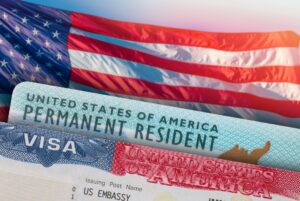At US-ILC, we listen, we care, we deliver: Let our 89 years of combined experience help you navigate the complexities of immigration law!
On June 4, 2025, the U.S. Citizenship and Immigration Services (USCIS) issued a press release announcing that the agency, in coordination with the U.S. Customs and Border Protection and Immigration and Customs Enforcement, will begin cracking down on immigrants who have overstayed their nonimmigrant visas. These agencies will allocate extra resources into reviewing immigration records to identify individuals who remain in the U.S. after their statuses expire.
This new initiative came on the tail of a terrorist attack in Boulder, Colorado, during which an Egyptian national who had overstayed his visa, threw Molotov cocktails into a crowd of demonstrators and injured 15 people. The incident put a spotlight on visa overstays and immigrants in this position are now being prioritized for removal. This is a stark move away from the Trump administration’s initial plans to focus removal efforts on undocumented immigrants who had committed crimes. Now, it is estimated that only ** percent of those detained or deported have criminal history.
Who Will This Crackdown Affect?
The crackdown will take aim at immigrants who entered the U.S. legally on nonimmigrant visas, such as B1/B2, F-1, or a host of temporary work visas, and then remained beyond the expiration date on their I-94 forms. This will not affect those who filed applications to extend their nonimmigrant statuses before their status had expired. The crackdown will also not affect immigrants who are in the permanent resident process, since this change only applies to temporary visas.
What Happens if You Overstay Your Visa?
Overstaying your nonimmigrant visa status can have serious consequences. Once your status has expired, you will start accumulating unlawful presence, which is an immigration violation rather than a criminal offense. While it will not lead to a jail sentence, you may still be subject to detention or deportation. If you overstay by more than 180 days, you will face a three-year ban after leaving the U.S. Moreover, if you overstay by more than one year, you will face a ten-year ban once you leave. Your unexpired visa will be invalidated and if you apply for a new visa after the bar, you may have a difficult time being approved.
What Can You Do if You Overstay Your Visa?
Many people who enter the U.S. on temporary visas do not plan to overstay. However, a change in circumstances, such as a job offer, unfinished plans, or even a sick relative, can push someone to remain in the U.S. beyond the expiration date on their I-94. If your visa expiration date is approaching and your circumstances have changed, it is best to explore extending or changing your status as soon as possible.
If you have already overstayed your visa and may be affected by the recent crackdown, or if have questions regarding another immigration matter, contact U.S. Immigration Law Counsel for a strategy session to discuss your case.




